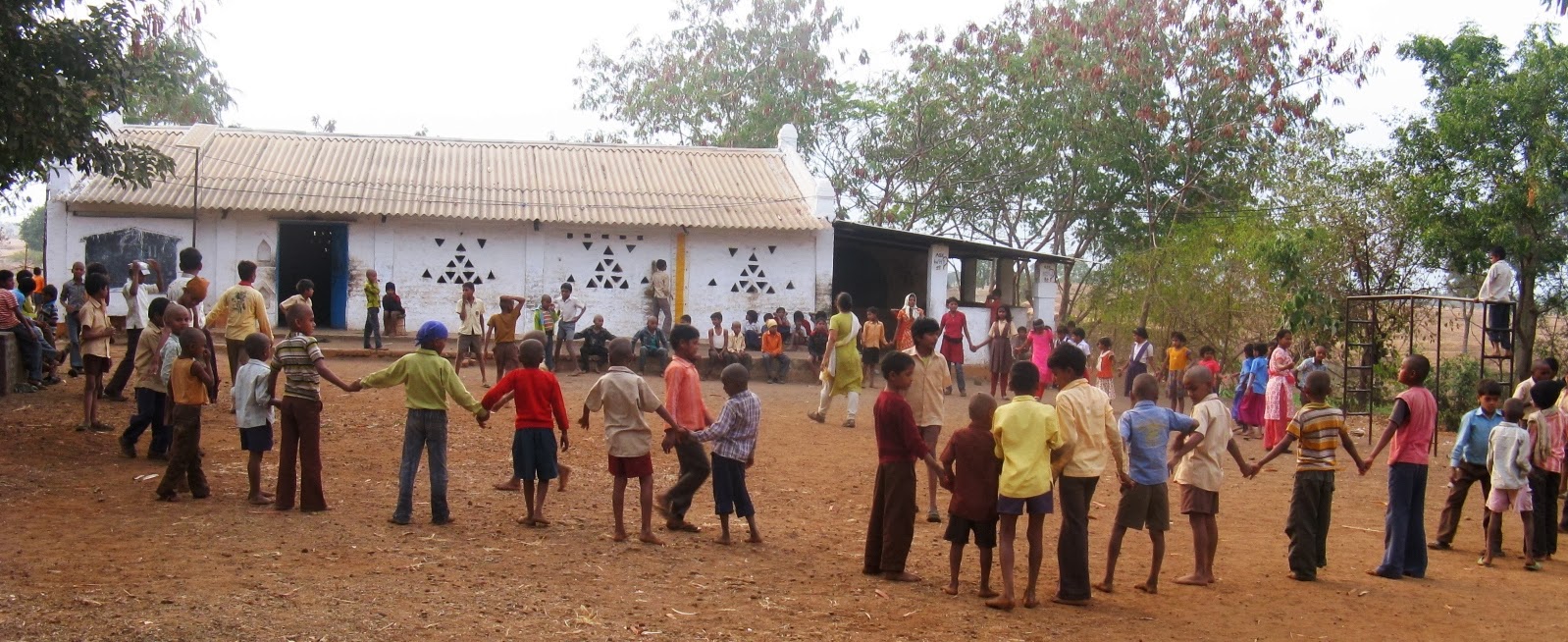I was happily sitting in a train bound to Kota when I got a call from Mr. Niranjan Haldar asking me when he can go to see the school ? Vow. Hardly anybody says this. Usually we are calling people to come over.
The next Saturday after much ghabrahat (usual in middle age men before a journey) we were in a bus to Sendhwa. I forgot to tell that Mr. Haldar or Haldar Sir, as he is popularly known in Indore, is a musician of great repute besides being a regular artist at the All India Radio. One of the few in India, definitely in Madhya Pradesh who play the Vichitra Veena, guitar and the synthesiser with equal ease. A true synthesis of the traditional and the modern. We got acquainted with him as our children learn music from him.
Reached Sendhwa by noon and from there to Adharshila in an auto-rickshaw, waiting for us at the bus stand. What luxury !
The children had a two hour session with him in the evening where he taught them the famous song - Aikla Choulo Re. Initially he was sceptical about teaching a Bengali song, that too Robindra Sangeet to adivasi children but the scepticism vanished in the first ten minutes seeing the ease with which the children picked up the lyrics as well as the tune. We helped them by writing the lyrics on the black-board.
We were not so surprised as we had seen them pick up Marathi, Tamil and Chattisgarhi songs which earlier visitors had taught them.
It was great to hear the anthemic song, Aikla Choulo whispering out of the door and jaalis of the hall. How easy it is to be one... with total strangers. Of course music makes it so much easier. Listen to the music -
http://www.facebook.com/photo.php?v=428391290581649
Next day again we had a session with another song - the Hindi version of another Robindra Nath song - Anand loke mangala loke and later as we were chatting in our verandah there was an impromptu session of Filmi, Folk and Patriotic songs. The children, Haldar Sir on the harmonium, and visitors from Bangalore, students of Azim Premji Institute - were all in it together.
But there's always more ... especially when you are at Adharshila, the heart of rural and that too tribal India - there was no electricity when we reached. None at night and not the next day too ... No electricity means no water as it has to be pumped. But HS was quite sporting and was even ready to visit the field in typical rural style.. but fortunately there was some water in the drum. Teachers enjoy some privileges.
The cot under the million star sky always makes up for the inconveniences of the day. We too on our part made it up with the traditional tribal feast for guests - kookdi and kudri (chicken and rice).
Hope we have more interaction with him in the future.
 |
| Aikla choulo re..... |
Reached Sendhwa by noon and from there to Adharshila in an auto-rickshaw, waiting for us at the bus stand. What luxury !
The children had a two hour session with him in the evening where he taught them the famous song - Aikla Choulo Re. Initially he was sceptical about teaching a Bengali song, that too Robindra Sangeet to adivasi children but the scepticism vanished in the first ten minutes seeing the ease with which the children picked up the lyrics as well as the tune. We helped them by writing the lyrics on the black-board.
 |
| Presenting the Haat calender to Mr. Haldaar |
We were not so surprised as we had seen them pick up Marathi, Tamil and Chattisgarhi songs which earlier visitors had taught them.
It was great to hear the anthemic song, Aikla Choulo whispering out of the door and jaalis of the hall. How easy it is to be one... with total strangers. Of course music makes it so much easier. Listen to the music -
http://www.facebook.com/photo.php?v=428391290581649
 |
| Bareli folk, filmi and patriotic song session. |
 |
| Prakaash, presenting a mud horse used in tribal ceremonies, with Jayashree. . |
But there's always more ... especially when you are at Adharshila, the heart of rural and that too tribal India - there was no electricity when we reached. None at night and not the next day too ... No electricity means no water as it has to be pumped. But HS was quite sporting and was even ready to visit the field in typical rural style.. but fortunately there was some water in the drum. Teachers enjoy some privileges.
The cot under the million star sky always makes up for the inconveniences of the day. We too on our part made it up with the traditional tribal feast for guests - kookdi and kudri (chicken and rice).
Hope we have more interaction with him in the future.














